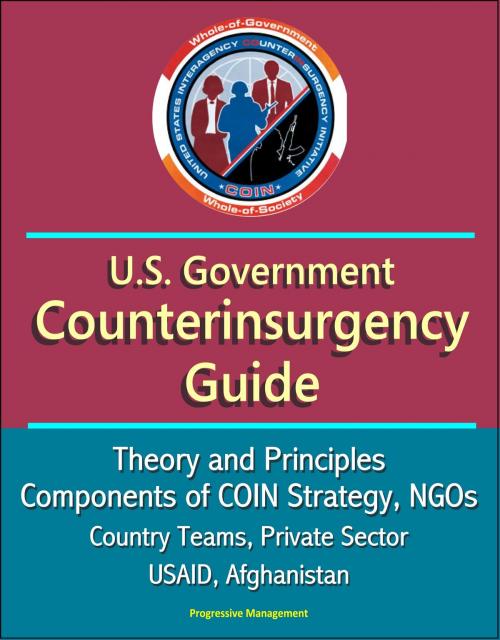U.S. Government Counterinsurgency Guide: Theory and Principles, Components of COIN Strategy, NGOs, Country Teams, Private Sector, USAID, Afghanistan
Nonfiction, Social & Cultural Studies, Political Science| Author: | Progressive Management | ISBN: | 9781311146199 |
| Publisher: | Progressive Management | Publication: | May 9, 2014 |
| Imprint: | Smashwords Edition | Language: | English |
| Author: | Progressive Management |
| ISBN: | 9781311146199 |
| Publisher: | Progressive Management |
| Publication: | May 9, 2014 |
| Imprint: | Smashwords Edition |
| Language: | English |
In recent years the United States has engaged in prolonged counterinsurgency campaigns in Afghanistan and Iraq. It has supported many other friendly governments facing internal subversion around the globe. In so doing it has both relearned old lessons, and forged new methods and concepts for the stabilization of moderate, freedom-oriented governments. This Guide, the first of its kind in almost half a century, distills the best of contemporary thought, historical knowledge, and hard-won practice. It is the best kind of doctrinal work: intellectually rigorous, yet practical.
Irregular warfare is far more varied than conventional conflict: hence the importance of an intellectual framework that is coherent enough to provide guidance, and flexible enough to adapt to circumstances. Counterinsurgency places great demands on the ability of bureaucracies to work together, with allies, and increasingly, with nongovernmental organizations. That it is co-signed by the leaders of the Departments of State and Defense and the U.S. Agency for International Development says a great deal about the partnership between these and other departments that has been, and will be, required if we are to succeed in the future. Although much of our ability to knit together lines of effort arises from the field, there is an important role for policy-relevant thought about first order questions. This Guide provides that.
American counterinsurgency practice rests on a number of assumptions: that the decisive effort is rarely military (although security is the essential prerequisite for success); that our efforts must be directed to the creation of local and national governmental structures that will serve their populations, and, over time, replace the efforts of foreign partners; that superior knowledge, and in particular, understanding of the 'human terrain' is essential; and that we must have the patience to persevere in what will necessarily prove long struggles.
Executive Summary * Chapter One: Theory and Principles * Chapter Two: Components of COIN Strategy * Chapter Three: Actors * The Affected Government * The U.S. Country Team * The International Community * Inter-Governmental Organizations (IGOs) * Non-Government Organizations (NGOs) * The Private Sector * Chapter Four: Assessment and Planning * Conclusion
In recent years the United States has engaged in prolonged counterinsurgency campaigns in Afghanistan and Iraq. It has supported many other friendly governments facing internal subversion around the globe. In so doing it has both relearned old lessons, and forged new methods and concepts for the stabilization of moderate, freedom-oriented governments. This Guide, the first of its kind in almost half a century, distills the best of contemporary thought, historical knowledge, and hard-won practice. It is the best kind of doctrinal work: intellectually rigorous, yet practical.
Irregular warfare is far more varied than conventional conflict: hence the importance of an intellectual framework that is coherent enough to provide guidance, and flexible enough to adapt to circumstances. Counterinsurgency places great demands on the ability of bureaucracies to work together, with allies, and increasingly, with nongovernmental organizations. That it is co-signed by the leaders of the Departments of State and Defense and the U.S. Agency for International Development says a great deal about the partnership between these and other departments that has been, and will be, required if we are to succeed in the future. Although much of our ability to knit together lines of effort arises from the field, there is an important role for policy-relevant thought about first order questions. This Guide provides that.
American counterinsurgency practice rests on a number of assumptions: that the decisive effort is rarely military (although security is the essential prerequisite for success); that our efforts must be directed to the creation of local and national governmental structures that will serve their populations, and, over time, replace the efforts of foreign partners; that superior knowledge, and in particular, understanding of the 'human terrain' is essential; and that we must have the patience to persevere in what will necessarily prove long struggles.
Executive Summary * Chapter One: Theory and Principles * Chapter Two: Components of COIN Strategy * Chapter Three: Actors * The Affected Government * The U.S. Country Team * The International Community * Inter-Governmental Organizations (IGOs) * Non-Government Organizations (NGOs) * The Private Sector * Chapter Four: Assessment and Planning * Conclusion















